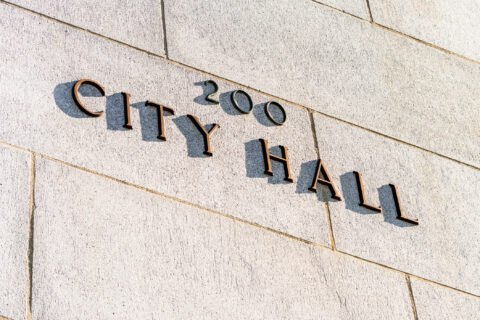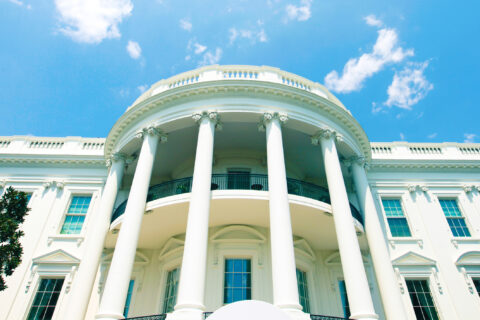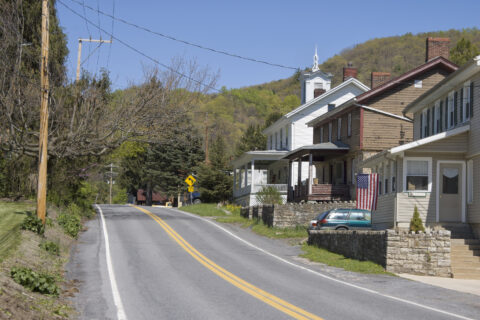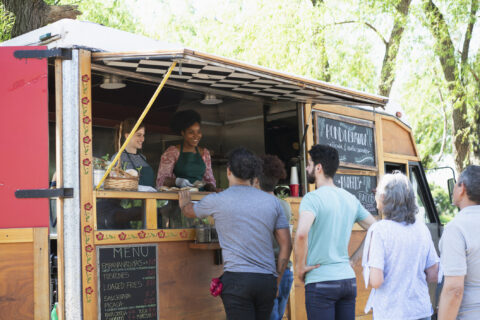Prior to the COVID-19 pandemic, more than half of the total households in the City of Roanoke were already struggling to make ends meet. This included the number of households below the Federal Poverty Level (FPL) and households who are considered ALICE (Asset-Limited, Income-Constrained, Employed). ALICE households earn more than those considered in poverty and, while working, are unable to afford necessities like housing, child care, food, healthcare, and transportation. Strikingly, the percentage of ALICE Households is significant across the City of Roanoke, ranging from 25%-40% in all zip codes within the City limits.
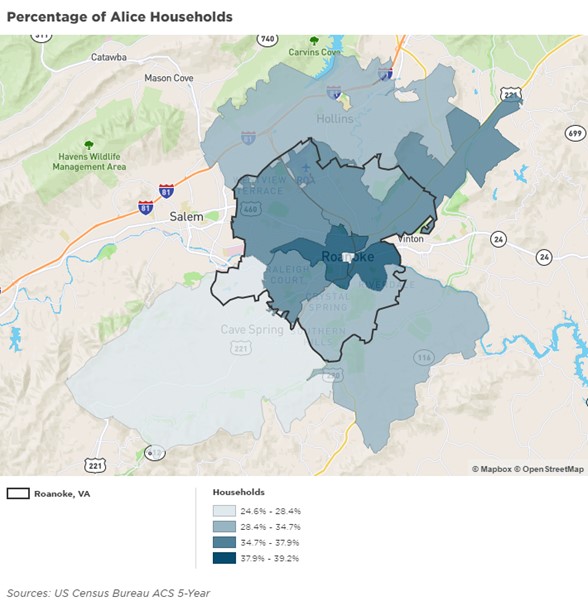
With this as the backdrop, the economic repercussions of COVID were widespread and disproportionate in their impact. Loss of income from reduced hours or lost jobs, inability to afford food, falling behind on bills, anxiety, and depression, lack of child care, and the added burden of virtual learning and homeschooling, created an avalanche of challenges spotlighting the vulnerability of this hidden segment of the population. It was a sobering reality check prompting the realization of City leadership that facilitating recovery and rebuilding for these families would require an aggressive and radically different approach than providing typical support services.
Luckily, with the pandemic came a series of federal government funds that allowed for the exploration of innovative solutions. Starting with the Coronavirus Aid, Relief, and Economic Security (CARES) Act funding, the City of Roanoke prioritized funding with input from its local citizens, and along with its nonprofit partners expanded eligibility to allow those below the ALICE threshold to access much-needed support. When it came time to invest its American Rescue Plan Act (ARPA) funding, the City again called on the wisdom of its citizens and partners to identify long-term recovery and resiliency strategies. Among its resiliency investments, $3 million was earmarked for a workforce/skills development pathways initiative – an initiative intended to identify the needs of employers in high-growth, high-potential sectors, and gaps that may exist in the local workforce and align development and training programs for youth, unemployed and underemployed. Also, in the midst of the pandemic, the City of Roanoke successfully launched the Roanoke Financial Empowerment Center providing no-cost, one-on-one financial counseling from trained professionals.
Enter the National League of Cities’ Equitable Economic Mobility Initiative (EEMI). Through our EEMI grant, the City of Roanoke was given the opportunity to better understand the needs of the population most impacted by the pandemic, and begin to explore their interest and receptiveness to an employer-driven career pathways initiative. Towards the end of 2021, the EEMI powered a survey that sought to identify challenges to household economic stability. This research was built on a previous COVID impact survey conducted by United Way of Roanoke Valley in Spring 2021. 86% of survey respondents represented those in poverty (44%) and ALICE (42%).
The survey showed that ALICE respondents were primarily working in healthcare, food service, and retail trade. Opportunities for advancement within these essential fields could help ALICE workers achieve economic stability. ALICE respondents were largely motivated to secure improved employment and take on greater responsibility at work. Some want to shift to professional, business, and IT jobs. However, ALICE workers need more training, continued education, and skill development to secure such employment opportunities. Because ALICE households struggled to pay for basic expenses during COVID-19, local to federal programs should continue to offer supplemental assistance and emergency financial support inclusive of this group.
These findings, as well as ALICE data visualized through mySidewalk and discussions with NLC staff, guided the development of an employment pilot cohort that would not just receive traditional employment, training in targeted industries, awareness and knowledge of employment opportunities in the City’s Innovation Corridor (think healthcare, biomedicine, and life sciences), but also supplemental assistance for things like food, rent, child care, transportation, uniforms/tools, etc.
With the City of Roanoke engaging the Greater Roanoke Workforce Development Board in its $3 million workforce investment in an effort dubbed Star City Works, EEMI plans evolved to better leverage both funding sources and other assets already available through this partnering entity. Since the Star City Works program design aligned and had similar elements as the intended EEMI pilot, further conversations showed that the biggest opportunity for EEMI funds was to use them to complement both federal workforce development funding and City of Roanoke ARPA funds. EEMI funds would be used to blend and braid these funding streams, and fill in the gaps to create a more seamless system. Thus a new, strengthened workforce development effort was formed connecting the pipeline of interest to these high-demand industry jobs, and the ability to deliver employer-ready workers. This more robust approach includes outreach and awareness-building in targeted neighborhoods whose residents were most disproportionately impacted by the pandemic.
So where do we go from here? Star City Works launched in August and just completed its first hiring event. Career Quest, an annual career fair for youth with a focus on high-tech, high-demand jobs, runs at the end of September with 30 employers across the region providing interactive displays of their respective fields. Roanoke City Public School students have increased opportunities to participate in this experience thanks to transportation support and outreach efforts. Additional opportunities to align with employers already planning to create career pathways internally are being explored. Partnerships with local nonprofits including those providing basic needs, health and mental health services, and child care are actively being pursued to remove the most critical barriers to successful training completion and employment retention.
Things are certainly shining a little brighter in the Star City these days, and the stepping stones on the pathway towards economic mobility are finally being put in place.
Connect with Us
Sign up for the Economic Mobility Peer Network to connect with other cities and hear from leading experts on topics designed to help cities boost residents’ economic mobility using strategies grounded in equity.
About the Author:
Bob Cowell, City Manager for Roanoke, VA.

